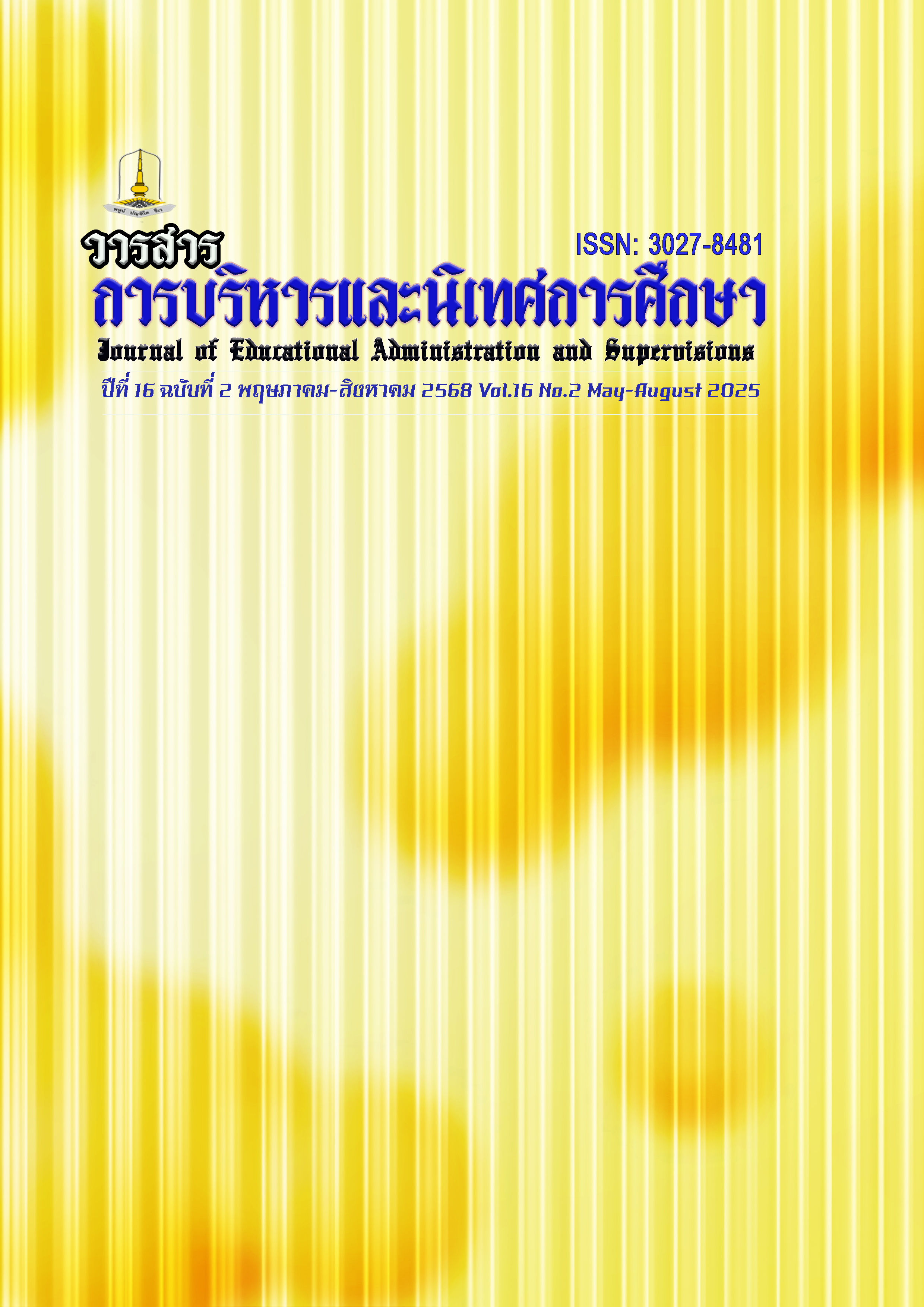Guidelines for Sustainable Leadership Development of School Administrators under the Office of Mahasarakham Secondary Educational Service Area
Main Article Content
Abstract
.The research objectives were: 1) to explore the existing and desirable situations, and the
priorityneeds to develop sustainable leadership of school administrators; and 2) to investigate the guidelines for sustainable leadership development of school administrators under the
Secondary Educational Service Area Office Mahasarakham. Mixed methods research was
employed, which divided into two phases. The 1st phase was exploring the existing situation, desirable situation, and the priorityneeds to develop sustainable leadership of school
administrators. The samples were 54 school administrators and 272 teachers, totality317 under the Secondary Educational Service Area Office Mahasarakahm, randomized by using stratified random sampling technique based onschool sizes. The 2nd phase was investigating the guidelines
for sustainable leadership development of school administrators. The informants were 5 outstanding administrators onsustainable leadership, and 5 experts toevaluate the guidelines to develop sustainable leadership. The research instruments were a 5-rating scale questionnaire
with reliability of the existing situation at .867 and the desirable situation at .881, an interview
Downloads
Article Details

This work is licensed under a Creative Commons Attribution-NonCommercial-NoDerivatives 4.0 International License.
References
กรุณา ศรีแสน. (2561). การพัฒนาตัวบ่งชี้และแนวทางการพัฒนาภาวะผู้นำที่ยั่งยืนสำหรับผู้บริหารโรงเรียน สังกัดสำนักงานคณะกรรมการการศึกษาขั้นพื้นฐาน. [วิทยานิพนธ์ปริญญาดุษฎีบัณฑิต, มหาวิทยาลัยขอนแก่น].
ทิวากานต์ ศรีสวัสดิ์. (2558). ภาวะผู้นำแบบยั่งยืนของผู้บริหารสถานศึกษา สังกัดสำนักงานเขตพื้นที่การศึกษามัธยมศึกษาเขต 19. [วิทยานิพนธ์ปริญญามหาบัณฑิต, มหาวิทยาลัยขอนแก่น].
ธีระนันต์ โมธรรม, วาโร เพ็งสวัสดิ์ และเอกลักษณ์ เพียสา. (2566). องค์ประกอบภาวะผู้นำแบบยั่งยืนของผู้บริหารโรงเรียน สังกัดสำนักงานเขตพื้นที่การศึกษามัธยมศึกษานครพนม. วารสารวิจัยวิชาการ, 6(3), 77-92. https://doi.org/10.14456/jra.2023.56
บุญชม ศรีสะอาด. (2560). การวิจัยเบื้องต้น (พิมพ์ครั้งที่ 10).สุวีริยาสาส์น.
ปภาวี พิพัฒนลักษณ์ และคณะ. (2559). กลยุทธ์การพัฒนาภาวะผู้นำของผู้บริหารโรงเรียนร่วมตามแนวคิดภาวะผู้นำที่ยั่งยืน เพื่อเสริมสร้างชุมชนการเรียนรู้ทางวิชาชีพ. [วิทยานิพนธ์ปริญญาดุษฎีบัณฑิต, จุฬาลงกรณ์มหาวิทยาลัย]
วสันต์ ศักดาศักดิ์. (2565). แนวทางการพัฒนาภาวะผู้นำที่ยั่งยืนกับประสิทธิภาพการบริหารงานวิชาการโรงเรียนของผู้บริหารสถานศึกษา สังกัดสำนักงานเขตพื้นที่การศึกษามัธยมศึกษานนทบุรี. วารสารครุศาสตร์จุฬาลงกรณ์มหาวิทยาลัย,50(1), 1-14. https://digital.car.chula.ac.th/educujournal/vol50/iss1/9
สมเกียรติ ตั้งกิจวานิชย์. (2563). ระบบการศึกษาต้องเร่งปรับตัวในโลกที่กำลังพลิกผัน. กองทุนเพื่อความเสมอภาคทางการศึกษา (กสค).
สำนักงานเขตพื้นที่การศึกษามัธยมศึกษามหาสารคาม. (2565). แผนพัฒนาคุณภาพการศึกษาขั้นพื้นฐาน พ.ศ.2565-2569 สำนักงานเขตพื้นที่การศึกษามัธยมศึกษามหาสารคาม. สำนักงานคณะกรรมการการศึกษาขั้นพื้นฐาน กระทรวงศึกษาธิการ.
สำนักงานเลขานุการของคณะกรรมการยุทธศาสตร์ชาติ. (2562). ยุทธศาสตร์ชาติ 20 ปี พ.ศ. 2561-2580. สำนักงานคณะกรรมการพัฒนาการเศรษฐกิจและสังคมแห่งชาติ.
สุนทรีพร อำพลพร, อรสา จรูญธรรม และชาญชัย วงศ์สิรสวัสดิ์. (2564). สังเคราะห์องค์ประกอบภาวะผู้นำที่ยั่งยืนของผู้บริหารสถานศึกษา. วารสาร มจร บาฬีศึกษาพุทธโฆสปริทรรศน์, 7(3), 194-208. https://so05.tci-thaijo.org/index.php/Palisueksabuddhaghosa/article/view/252323
สุวิมล ว่องวาณิช. (2562). การวิจัยประเมินความต้องการจำเป็น (พิมพ์ครั้งที่ 4). สำนักพิมพ์แห่งจุฬาลงกรณ์มหาวิทยาลัย.
Avery, G., & Bergsteiner, H. (2011). Honeybees & locusts: The business case for sustainable leadership. Allen & Unwin.
Hargreaves, A., & Fink, D. (2012). Sustainable leadership. John Wiley & Sons.
Hargreaves, A., & Fink, D. (2004). The seven principles of sustainable leadership. Educational leadership, 61(7), 8-13. http://facilitatoru.com/data/guides/SL%20Principles.pdf
Krejcie, R. V., & Morgan, D. W. (1970). Determining sample size for research activities. Educational and psychological measurement, 30(3), 607-610.
https://journals.sagepub.com/doi/abs/10.1177/001316447003000308
Ofei-Manu, P., & Didham, R. (2014). Quality education for sustainable development: A priority in achieving sustainability and well-being for all. Policy brief, Institute of Global Environmental Strategies.
Suriyankietkaew, S., & Avery, G. (2014). Employee satisfaction and sustainable leadership practices in Thai SMEs. Journal of Global Responsibility, 5(1), 160-173. https://www.emerald.com/insight/content/doi/10.1108/JGR-02-2014-0003/full/html
UNESCO. (2017). Education for Sustainable Development Goals: Learning Objectives. United Nations Educational. https://unesdoc.unesco.org/ark:/48223/pf0000247444


